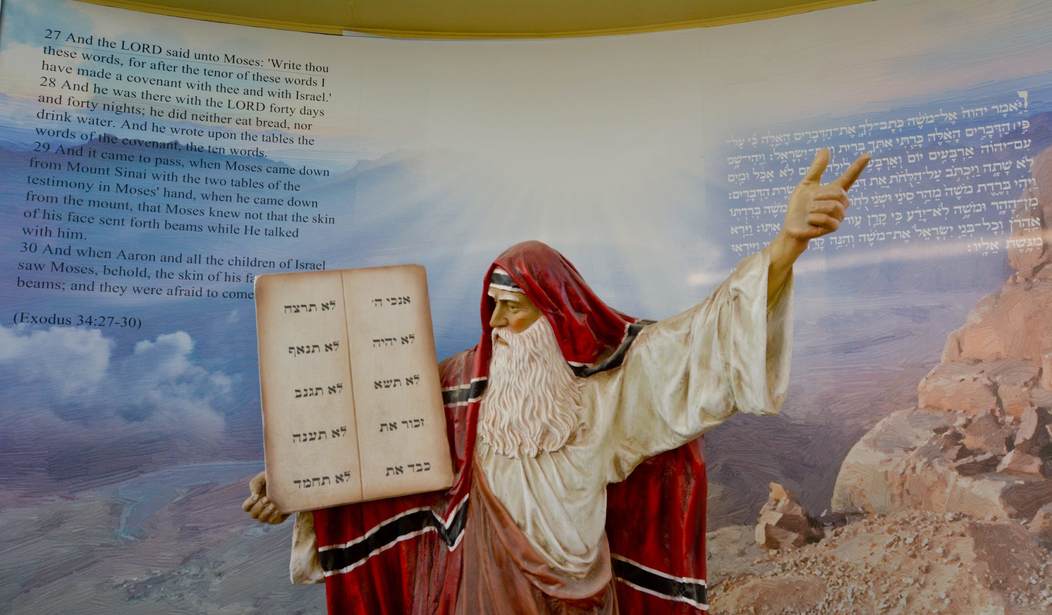This month (and the first week of April) Jews and Christians will observe their most holy celebrations: Passover and Easter. Both celebrations are based in the story of God’s redemption of Israel in the Pentateuch (that’s Greek for “the first five books of the Bible”). Israel was brought out of slavery from Egypt in the second book of the Pentateuch, Exodus, and Jesus’ trial, crucifixion, and resurrection all centered around the Jewish feasts of Passover, Unleavened Bread, and First Fruits (all stipulated in the book of Exodus).
In more than a few places, the Bible declares Moses to be the author (Exodus 17:14; 24:4; Deuteronomy 31:9-11). In the New Testament, Jesus and the Apostles make the same claim that Moses wrote the stories of Genesis, Exodus, Leviticus, Numbers, and Deuteronomy (Matthew 19:8; Mark 12:26; Acts 3:22; Romans 10:5). For centuries, both Jews and Christians believed that these books were penned by Moses around the 15th century B.C.
However, about 200 years ago or so, skeptics from Europe began to think that Moses was not the author at all; they proposed that a series of authors over a period of hundreds of years wrote down independent stories, then edited and re-edited them until they came down to us in their present form roughly 400 years before the birth of Jesus.
Critics label one author or group of authors “J” because he supposedly used the name “Yahweh”/”Jehovah” for God. “E” is the author using “Elohim” for God. “D” wrote Deuteronomy during the reforms of Josiah in the 7th century B.C. And “P” stands for the priests who wrote and edited much of the Old Testament after the exile in Babylon.
This theory (sometimes called the JEDP Theory or the “Documentary Hypothesis”) essentially undermines the Jewish and Christian concept of inspiration and credibility of the Bible. If Moses did not write these books when the Bible clearly says he did, then basically these books are unhistorical and are merely pious frauds. In that case, the Jewish and Christian beliefs in a redeemer God are based on fiction and not history.
What is the evidence for this “Documentary Hypothesis”? Pretty much the argument boils down to this: supposedly, writing wasn’t even around in the 15th century B.C (or in the 13th century as some claim it was written). Okay, maybe writing with picture words was around, but certainly not an alphabet. Therefore, if writing with an alphabet was not around at that time, then Moses could not have written the first five books of the Hebrew Bible.
Also, it seems that the Hebrews used two different words for God throughout the Old Testament: Yahweh and Elohim. Well that right there PROVES beyond all doubt that there were multiple authors, doesn’t it? After all, no one ever uses more than one word to describe the same person, object, or idea, right? Our vocabulary never changes when we are telling stories or writing poetry or giving a law code or expounding wise sayings, right?
Of course we do, all the time. This contention that there are multiple authors because of different vocabulary denies basic human writing skills. But that is really the core of this “Documentary Hypothesis.”
So what evidence is there that the Pentateuch, the foundation of both Jewish and Christian faiths, was actually written by Moses and that this whole Documentary Hypothesis is a fraud?
1. Moses could write in the 15th century B.C.
Remember, he was a prince of Egypt, and the Egyptians certainly could write volumes! Writing in the form of hieroglyphics and cuneiform existed 1,000 years or more BEFORE the time of Moses (take a look at the Ebla tablets for proof).
Furthermore, Phoenicians had created the alphabet before the time of Moses. Archeologists have discovered proto-Phoenician writing on cave walls in Egypt from the 18th century B.C!
In addition, the Ras Shamra letters (clay tablets) have writing in Canaanite Ugaritic from the 15th century … the same time Moses would have written the Pentateuch.
2. The same author can use different vocabulary.
I know that’s a real shock, isn’t it? The critics assume that the Hebrew author was different from all other authors in history. He must be incapable of using more than one name for God or using more than one writing style.
I know this may stun some people, but my writing style changes depending on my mood, purpose, and audience. There is a huge difference between the words I use in a mushy love letter to my wife and a letter I write to the IRS. And no, I don’t get them confused. It’s amazing but when I write business letters, a thesis or dissertation, or a note to myself or one of my kids … I am still the author of all of those things, and I don’t suffer from multiple personality disorder!
I’m still the same guy. Moses was still the same guy when he wrote all those books too.
3. Innocent until proven guilty.
It is amazing to me that “scholarly” critics of the Bible assume that any biblical statement is automatically false, or written by someone other than the purported author, until proven true. However, they don’t seem to use that same standard with other ancient texts outside the Bible.
Most historians assume without equivocation that Homer is the author of the The Odyssey and the The Iliad, Plato is the author of his “Republic,” and Julius Caesar is the author of “The Gallic Wars.” Why the double standard? I guess some people don’t think much of the “innocent until proven guilty thing.”
4. Inconsistent internal tests.
What fascinates me is that “scholars” assume that without any other ancient Hebrew literature to compare with the biblical text, they can with “certainty” establish the date of the writing of each book. How do they do that? Also, the same critics base their Documentary Hypothesis theory on phrases and words from the biblical text, but then at the same time they disregard evidence from the same Bible when it conflicts with their theories.
5. Repetition of stories.
Many skeptics over the years have pointed out that the Bible repeats stories (in different forms). For example, there are two accounts of creation in the first two chapters in Genesis. Noah is told to go into the ark twice. There are two givings of the Law from Moses, etc. Well, all of that MUST prove that there are at least two authors.
Not really. Repetition and doublets are common literary devices in ancient middle eastern literature. It is still common today for us to tell a story, then later re-tell it (sometimes within the hour!) with extra detail. Yet we are the same author of the story. Biblical Archaeology’s Duane Garrett wrote a great article debunking this entire argument from the Documentary Hypothesis.
6. No external evidence of multiple authors.
Lastly, the critics of the Bible rely entirely upon internal evidence — that is, the vocabulary and style of writing — to make their case. However, there is NO — ZERO — external evidence … not one shred of hard physical evidence from any manuscript or any ancient writings (Jewish or Christian from the first century until the 19th century A.D.) that someone other than Moses composed the first five books of the Bible. All the manuscript evidence, all the testimony from orthodox Jewish and Christian scholars until the 19th century AD, is for a unified, single authored Pentateuch as we have it.
For a more detailed discussion of this issue, I recommend John Ankerberg’s interview (several years ago) with Dr. Gleason Archer, one of the greatest Hebrew scholars (and Christian apologists) of the 20th century.
It really does matter what you believe about this, and what the evidence points to. If Moses did not write these books as the Bible claims, then the Bible is lying. If Moses did write these books, then he has something very important to say to us today in the 21st century … and we should pay attention to it.









Join the conversation as a VIP Member